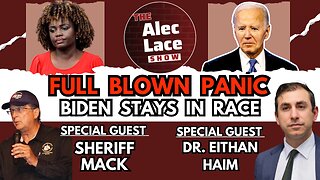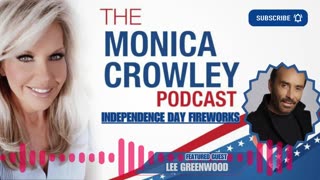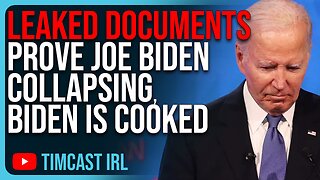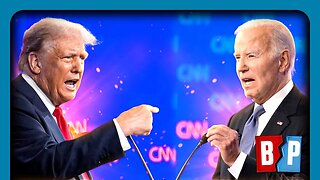Mike Winger Critique Episode 13: Understanding the Passover Sacrifice
Idol Killer host Warren McGrew and podcaster Paul Vendredi turn their attention to the Passover, which they identify as a sacrifice of iconoclasm, as opposed to Mike Winger’s view that it is a symbol of penal-substitutionary atonement (PSA). They compare Old-Testament passages like Exodus 12;12 and Numbers 33;3-4 to New-Testament passages like 1 John 3;8 and Hebrews 2;14, demonstrating that the Passover and Christ (who fulfils the Passover) served to destroy the works of the devil.
Paul turns to a third-century work called the Didascalia Apostolorum, which states that God did not command sacrifices from Cain and Abel and that their offerings led to a murder. This passage suggests that sacrifices, especially animal sacrifices, can be harmful. Paul emphasizes that this view is consonant with the early Church Fathers' position that God is not subject to the law of necessity and is immutable and impassable. Therefore, human sin does not affect God and sacrifices do not benefit him. Warren adds to the case. Using the parable of The Prodigal Son, he explains that the father's slaying of the fatted calf was a celebratory act of reconciliation and redemption, not a brutal sacrifice required to appease him.
Paul then distinguishes between the first and second legislations. The Church Fathers applied the term “second legislation” to all the sacrificial laws put in place after Exodus 32, which God established as a merciful accommodation designed to keep the Israelites from sliding into even worse idolatry. God allowed the Israelites to think they were appeasing him with blood sacrifices and that he was smelling the aroma of burning carcasses on the altar, when in reality no such thing was happening. Christ did not fulfill these sacrifices because they were not part of the original plan. Christ fulfills only the sacrifices prior to the Golden Calf.
Paul clarifies the distinction between the Passover lamb and the goats of Yom Kippur, contending that Mike Winger has confused these concepts. John the Baptist and the Pauline Epistles directly identify Jesus as the Passover Lamb, while the Day of Atonement, which involves goats, is only mentioned indirectly in the New Testament. Paul also points out that Winger has mistakenly assumed that sheep and goats--completely different genera--are interchangeable animals. Warren notes the atonement school’s inconsistency in using the distinction between sheep and goats as a sign of the elect while failing to distinguish between them in its atonement theory.
Winger also confuses the Last Supper (which took place BEFORE Passover) with Jesus' crucifixion (which took place DURING Passover). Paul points out that the Last Supper narratives in the Bible describe Jesus and his disciples eating leavened bread, which is not used in Passover meals. While avoiding a detour into apologetics, Paul notes that the Eastern Orthodox Church is the only Christian body that correctly observes leavened bread in the Eucharist, as it is a reenactment of the Last Supper, not a Passover meal.
-
 1:05:25
1:05:25
Russell Brand
9 hours agoTRUMP'S SHOCKING LEAK: Biden Destroyed | UK Elections: Just a New Face for Globalism? - SF 400
174K378 -
 2:01:42
2:01:42
LFA TV
9 hours ago4TH OF JULY SPECIAL! | LIVE FROM AMERICA 7/4/2024 11am est
90.8K112 -
 2:02:15
2:02:15
TheAlecLaceShow
8 hours agoGuests: Dr. Eithan Haim | Sheriff Richard Mack | Biden Stays In | Dems In Panic | The Alec Lace Show
35K7 -
 57:19
57:19
TheMonicaCrowleyPodcast
7 hours agoThe Monica Crowley Podcast: Independence Day Fireworks
39.7K14 -
 10:45
10:45
TimcastIRL
1 day agoLeaked Documents PROVE Joe Biden Collapsing, Democrats Own Polling Show Biden Is COOKED
81.4K135 -
 2:57:55
2:57:55
Wendy Bell Radio
14 hours agoReturn Of The King
91.9K165 -
 7:27
7:27
Breaking Points
3 days ago72%: Biden 'NOT COGNITIVELY FIT' For Presidency
67.6K66 -
 6:08
6:08
Caleb Hammer
28 days agoCaleb Decides To Help Out Homeless Guest Mid Show
53.9K2 -
 LIVE
LIVE
SoniCentric
18 hours agoHappy Fourth of July Fireworks & Patriotic Music
338 watching -
 37:17
37:17
Digital Social Hour
3 days ago $0.04 earnedThe Real Reason Sneako Was Banned on YouTube | Sneako
75.9K29